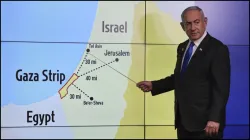Israeli PM Netanyahu says he will agree to permanent Gaza ceasefire under THIS condition
Netanyahu's stance on the Philadelphi corridor has threatened to derail ceasefire efforts in Gaza as Hamas and other negotiators have called for a full Israeli withdrawal. Israel claims Hamas smuggles weapons and supplies through the corridor located at Gaza's border with Egypt.

Jerusalem: Israeli Prime Minister Benjamin Netanyahu, who is under immense pressure at home and abroad, says he will only agree to a permanent ceasefire in Gaza if Israel is given open-ended control of Gaza's border with Egypt so that Hamas can never use it to achieve its nefarious objectives. Netanyahu's stance on the Philadelphi corridor has threatened to derail ceasefire efforts as Hamas has demanded a full Israeli withdrawal from Gaza in a multi-phase truce deal.
"You have to understand that the centrality of the Philadelphi Corridor to the arming of Gaza, to the arming of Hamas and this all led to the October 7th massacre, which Hamas has vowed, proudly vowed to do again and again and again," said Netanyahu at a press conference, asserting that Gaza can never have a future as long as the corridor remained porous.
"I'm willing to make a deal. I made one already, one that brought back 150 hostages, 117 alive. And I'm committed to return the remaining 101. I'll do everything I can to get them in. But leaving Philadelphi does not advance the release of the hostages, because the deal cannot be advanced... If we leave Rafah, if we leave the Philadelphi Corridor, there won't be any pressure. We won't get the hostages," Netanyahu further said.
Why the focus on Philadelphi corridor?
The issue of the so-called Philadelphi corridor, a narrow crossing in Gaza's border with Egypt where Israel claims Hamas smuggles weapons in the war-torn territory, has been a major point in efforts to secure a deal to halt the fighting in Gaza. Israel has demanded guarantees that whoever ran post-war Gaza would prevent the corridor from being used as a route to smuggle weapons and supplies for Hamas.
“Bring me anyone who will actually show us … that they can actually prevent the recurrence” of smuggling, he said. "We're open to consider it, but I don't see that happening right now," said Netanyahu, who has insisted on retaining control of the corridor, where Israeli troops have uncovered dozens of tunnels that officials say have been used to supply Hamas with weapons and ammunition.
He has faced heavy criticism from many in Israel for holding out on the issue, including from many in his own security establishment who believe Israeli troops can make targeted interventions if needed to prevent any smuggling. Additionally, However, Egypt, a mediator in the talks along with the US and Qatar, has also demanded a concrete timeline for Israeli troops to leave the Philadelphi corridor.
The United Arab Emirates, which established formal ties with Israel in the 2020 Abraham Accords, also criticised the Israeli stance on Wednesday.
US races for new ceasefire proposal
Meanwhile, the White House is scrambling to put forward a new proposal for a Gaza ceasefire and the release of hostages by Hamas in the coming days, which aims to work out the major sticking points behind a months-long impasse in talks mediated by the United States, Qatar and Egypt.
The deal will focus on three components - humanitarian aid for Gazans, prisoner exchange and ceasefire agreements. "So, basically, 90 per cent of this deal has been agreed, and it’s been agreed on terms that even Hamas had in their own proposal," a senior administration official said at a press conference. The discussions have become complicated after the deaths of six hostages in Gaza.
There are two major obstacles for a ceasefire - Israel's demand to keep forces in the Philadelphi corridor and the specific individuals who would be included in an exchange of Hamas hostages and Palestinian prisoners in Israel, said the administration official, who declined to be identified. "There is a very strong perception on the part of the negotiators that the ceasefire is slipping away," a US official told Reuters.
(with inputs from agencies)
ALSO READ | Netanyahu promises Hamas 'will pay high price' as he pushes back against widespread protests in Israel
